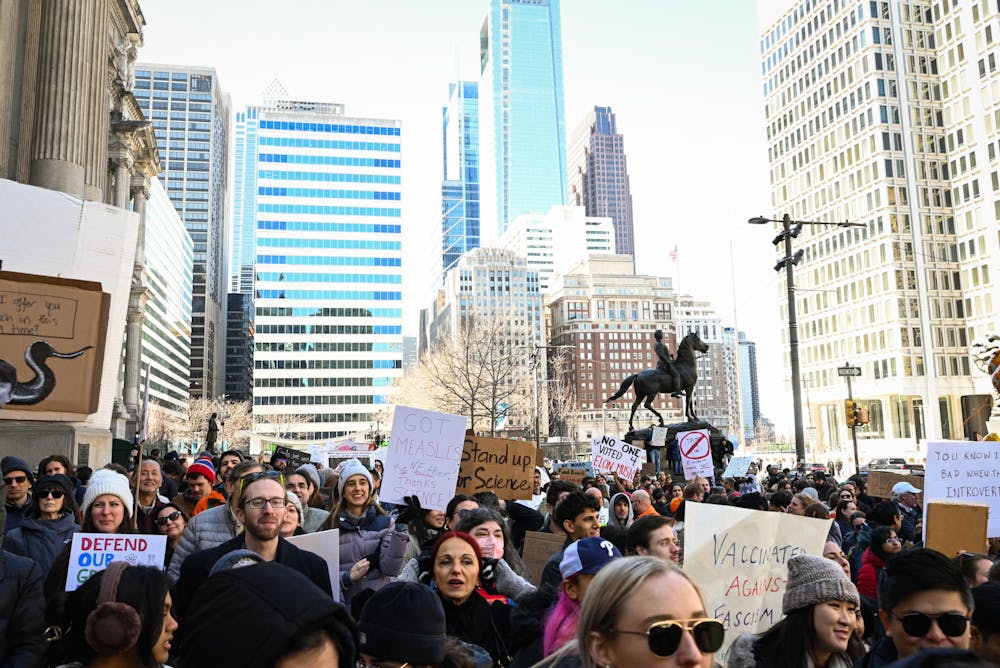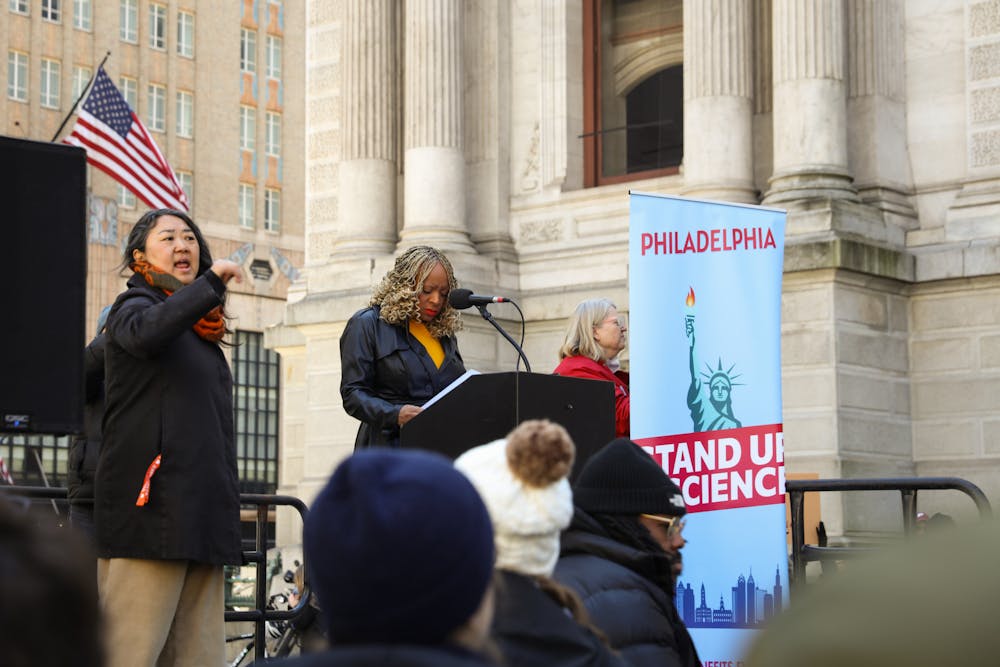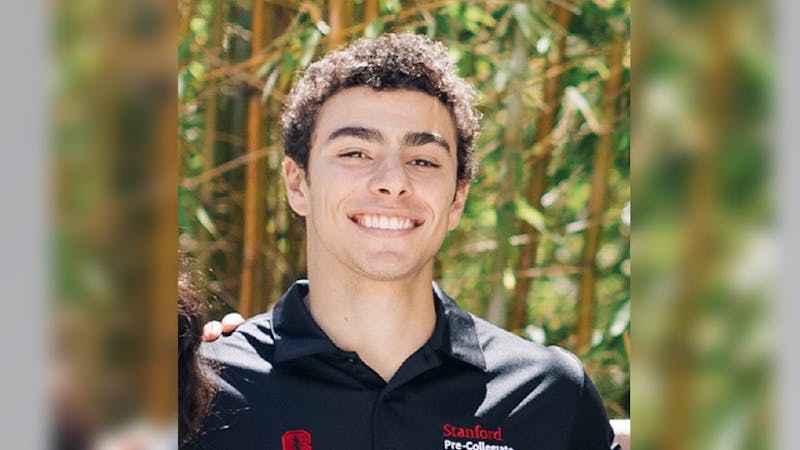
Hundreds of people gathered outside of Philadelphia City Hall to protest cuts to federal funding for science on Friday.
The March 7 "Stand Up for Science" rally, which drew roughly 1,000 attendees and lasted two hours, was part of a larger nationwide movement with events in 32 cities. The demonstration featured various speakers — including Penn affiliates — from a wide range of scientific disciplines, who spoke about the Trump administrations’ attempts to halt funding for research and gut diversity, equity, and inclusion programming.
Philadelphia City Councilmember and 2004 Stuart Weitzman School of Design graduate Jamie Gauthier, who represents the district that houses Penn, gave the first speech of the rally, in which she described University City as the “beating heart” of medical and scientific advancements.
“No community stands to lose more than ours from President Trump’s cruel and shameful decision to slash NIH funding,” Gauthier said. “Because we know that NIH funding is an investment in our entire community, not just scientists.”

Philadelphia City Councilmember Jamie Gauthier speaks at the "Stand Up for Science" rally on March 7.
Gauthier also criticized 1968 Wharton graduate and President Donald Trump’s “racist” cutbacks to DEI programs, citing the necessity of “diverse perspectives, experiences, and problem-solving approaches” to scientific innovation.
Associate professor at the Penn School of Veterinary Medicine Montserrat Anguera spoke about her epigenetics research, which aims to determine why autoimmune diseases disproportionately impact women.
Anguera told the crowd that two of her grant applications have been delayed, raising concerns that her research may soon stall. She added that training grants for Penn graduate students and postdoctoral fellows have similarly been affected.
Penn P.h.D. candidate in the Perelman School of Medicine's Graduate Group in Genomics and Computational Biology Lindsay Guare emphasized the importance of inclusivity and representation in research, which she said can help offset “systemic health disparities” for minorities.
Guare, who studies endometriosis, said her work is “under attack” by the federal government.
“This goes beyond funding,” Guare said. “If politics dictates what I can and cannot study, I fear I will fail the very people who need this research and who inspire me to do it.”
Guare also described a widespread fear among graduate students regarding the viability of their future careers amidst “chaos and indiscriminate funding cuts.”
Penn Chemical and Biomolecular Engineering P.h.D. candidate Sam Layding criticized the federal government’s funding cuts to scientific research as a means of “silencing dissent” and “forcing acquiescence.”
Layding also spoke out against Penn’s handling of federal directives and called for the crowd to “take back” decision-making power.
“Unfortunately, despite protests from every level below decision-making, University administrators and trustees seem more than willing to bend over backwards to accommodate people who have already made up their minds about wanting to destroy higher education,” Layding said.
Rally organizers started various chants during the rally, including “When our labs are under attack, what do we do? Stand up, fight back,” “What do we want? Science funding. When do we want it? Now,” and, “The people, united, will never be defeated.”
Penn Vice Provost for Climate Science, Policy, and Action and Earth and Environmental Sciences professor Michael Mann spoke at the larger "Stand Up for Science" rally in Washington D.C. on Friday.
In his speech, Mann deemed the current political state “the most challenging moment” for science that he could recall, adding that “science is under siege.”
Before the rally, the Penn Mind Center for Outreach, Research, and Education hosted a poster-making session that drew professors, researchers, and graduate students.
Penn post-baccalaureate research fellow Justine Shamber, who attended both the poster-making event and the rally, said she hoped the rally would bring visibility to the significance of scientific research.
“It’s important for people to know that science really does save lives,” Shamper said. “Cutting all of this funding or not seeing the importance … [it] can cost people their lives.”
Shamber is currently applying for her P.h.D. and has witnessed the effects of federal actions firsthand, noting that institutions are rescinding offers they had already extended to students.
Penn linguistics professor Gareth Roberts, who also attended the poster-making event and rally, said he has observed a drop in graduate student admissions, as well as grants being canceled and indirect funding caps harming research.
Roberts was “not incredibly optimistic” that the rally would galvanize governmental change, but he said it was important to show that people care about science.
MindCORE Director Heather Calvert said that while MindCORE is not yet directly affected by funding cutbacks, the group's programs that provide pathways for underrepresented students in the sciences could be at risk. Additionally, a National Science Foundation grant for the MindCORE Research Experience for Undergraduates program — which ran for three consecutive years — remains “pending," Calvert added.
The Daily Pennsylvanian is an independent, student-run newspaper. Please consider making a donation to support the coverage that shapes the University. Your generosity ensures a future of strong journalism at Penn.
Donate












